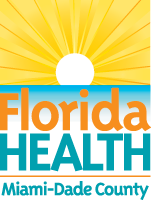FLORIDA DEPARTMENT OF HEALTH IN MIAMI-DADE COUNTY PROVIDING LIFESAVING NALOXONE TO REDUCE SUBSTANCE ABUSE DEATHS
November 02, 2022
Miami, Fla. – The Florida Department of Health in Miami-Dade County (DOH-Miami-Dade) is announcing the availability of free Naloxone (Narcan) Nasal Spray kits. This lifesaving medication could reduce thousands of substance abuse deaths across the state. Naloxone is available to people who use drugs, people with a history of drug use, others at risk of experiencing an overdose, friends, family members, and others who may witness an overdose. Kits consist of two Naloxone nasal sprays that are administered even without a health care professional present.
“Individuals can get Naloxone at the Florida Department of Health in Miami-Dade County. Naloxone when used in time can save lives by reversing the powerful effects of an opioid overdose,” said Yesenia Villalta, DNP, MSN, APRN, Health Officer/Administrator of the Florida Department of Health in Miami-Dade County.
Naloxone is a medication that reverses the effects of an opioid overdose, restoring breathing and consciousness within minutes of being administered to a person who has overdosed. Naloxone can be administered by a bystander (non-healthcare professional) before emergency medical assistance becomes available, but it is not intended to substitute for professional medical care. Individuals should call 911 immediately when an opioid overdose is suspected, before administering Naloxone.
Persons requesting a kit from DOH-Miami-Dade County must meet the following eligibility:
- Must be 18 years old or older
- Individuals at risk of experiencing an opioid overdose
- Caregivers who may witness an opioid overdose or others likely to experience or witness an opioid overdose.
Naloxone kits can be obtained at DOH-Miami-Dade County offices at the following locations:
Health District Center
1350 NW 14th Street
Miami, Florida 33125
Monday – Friday
8:00 a.m. – 4:30 p.m.
West Perrine Health Center
18255 Homestead Avenue
Miami, FL 33157
Monday – Friday
8:00 a.m. – 4:30 p.m.
Naloxone kits are free, and no appointment is necessary. People using Naxolone receive educational material, referrals, and connections for substance abuse intervention.
Increasing access to Naloxone is a critical component in battling the opioid epidemic, especially in rural areas or counties with limited access to health care. Providing Naloxone through county health departments will increase support to individuals across the state dealing with substance use disorder and help prevent overdose deaths in Florida.
The Florida Department of Health is working with the Florida Department of Children and Families through the Overdose Prevention Program, or iSaveFL, which facilitates the distribution of Naloxone kits to families, friends, and caregivers of those at risk for an opioid overdose. The iSaveFL website provides information on finding Naloxone in your community and resources on treatment, overdose education, and prevention.
This effort complements the Florida Department of Health’s HEROS (Helping Emergency Responders Obtain Support) program that provides free Naloxone to emergency response agencies.
This initiative is part of the state’s response to the overdose crisis. This month, Governor Ron DeSantis launched the Coordinated Opioid Recovery (CORE) program – the first of its kind in the nation – to provide comprehensive and sustainable care to those affected by substance use disorder.
A public health and safety alert was issued by the Florida Department of Health on July 8, 2022, to ensure Floridians remain vigilant of the signs of overdose. Anyone can access print and digital educational materials to help Floridians identify symptoms of an overdose here. The public health and safety alert is here.
Where is substance use disorder assistance available?
For questions regarding potential overdoses and other drug-related exposures, Florida’s Poison Control Centers are a valuable resource to individuals throughout Florida, including emergency personnel. Poison Control Centers are staffed by health care professionals that are specifically trained to treat drug overdoses or assess patients exposed to drugs of abuse. Medical toxicologists are available 24/7 for physician consultations. For poisoning questions or emergencies, call 1-800-222-1222. Visit the website at floridapoisoncontrol.org.
HEROS (Helping Emergency Responders Obtain Support) is a Florida Department of Health program that provides free Naloxone to emergency response agencies. All Florida first responders can request free Naloxone through this program. Since the program's inception in 2018, FDOH has distributed over 455,000 doses to emergency response agencies in Florida through HEROS. More HEROS information is here.
If you or your organization are interested in obtaining or managing Naloxone for the community, please visit I SAVE FL to find available resources through the Florida Department of Children and Families.
The Hope for Healing website is a tool for Floridians to access help for mental health and substance abuse. The Hope for Healing initiative focuses on helping Floridians find resources in challenging times through state and local partnerships using evidence-based best practices and addressing the stigma associated with seeking help. The site aggregates federal, state, local, private sector, faith-based, and non-profit resources. Learn more here.
Hope Florida - A Pathway to Prosperity utilizes ‘Care Navigators’ to guide Floridians on an individualized path to prosperity. ‘Care Navigators’ can help individuals identify their unique and immediate barriers to capital, develop long-term goals, and map out a strategic plan, including finding support for those with substance use disorders. The process focuses on community collaboration between the private sector, the faith-based community, nonprofits, and government entities to break down traditional community silos to maximize resources and uncover opportunities. Learn more here.




Connect with DOH